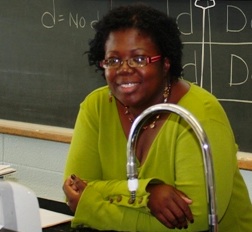On being a "cooperating" teacher: The greatest lesson ever
By Mary Bigelow
Posted on 2011-05-19
In a previous blog on student teaching, Christina Atton reflected on her student teaching in science. Her cooperating teacher, Ms. Chevin Stone (from Donald E. Gavit MS/HS in Hammond, IN), shares her experiences as Christina’s cooperating teacher.
When my principal emailed asking for a volunteer to work with a student teacher in a science classroom, I jumped at the opportunity. Part of me thought it would be great to have a few weeks of not writing lesson plans while advising a new recruit to the fine profession of science education. At the cooperating teachers meeting, I found out I’d only have my student for seven weeks. What could she possibly learn in a seventh grade classroom in such a short time?
She learned about classroom management.
The thing one never learns sitting in a college classroom is how to manage a class. You can talk about the techniques, watch all the Harry Wong videos ever produced, and even watch a veteran teacher work his or her magic in the classroom, but until you have to get students settled, on task and learning, it’s all just talk.
She learned that lesson that hard way. My kids are accustomed to me, the stern, “get it done or die” teacher who can keep the majority of the class on task and still sip her cup of tea without breaking a sweat. The best, most well-planned lesson is for naught however, if you don’t have control of the classroom.
My student teacher found out one night that her supervisor would be coming in first thing in the morning. The class being observed was an honors class of bright kids, some with Attention Deficit Disorder. The plan was for me to stay to take pictures of the center activities she was doing. I’m glad I was there.
In every seventh grade class, it seems there is at least one young man who makes you wonder what makes him tick. In this honors class, I have six like that. Never mind a visitor in the room, never mind I sat between the two groups of three as they worked. Between taking pictures, I quietly kept my “gang of six” on task. They decided, however, “It’s a sunny day, the birds are chirping, the girls look nice, and who cares if there’s ‘company in the house’——let’s put on a show.” Before the class period was over, three notebooks disappeared, a quarter used in one of the centers was reported missing and reappeared mysteriously on my desk, and a student reported all of his personal belonging stolen. On a bright note, the closing discussion went very well. (As part of a lesson on DNA, we discussed whether DNA really proved Osama bin Laden was dead.)
I’ve never been so embarrassed in my life. My student teacher corralled the group several times; only to have the “gang of six” find new ways disrupt and cause disarray whenever I moved more than five feet away from them. I even went so far as to haul three of them out of the room and give them one of my patented lectures. I apologized to the supervisor (who, incidentally, had been a professor of mine) and when my student teacher returned from her conference, she was frustrated, irritated, and just downright angry.
Classroom management is not something that can be learned in seven weeks. It takes nearly 4 weeks for a veteran teacher to pin down the nuances of personality and behavior. She’d been dutiful in watching me use various techniques to get the lesson started, moving, and flowing smoothly. I often use centers, which can be a great teaching/learning tool. However, in a large class, it’s important to work the “center magic” in such a way that everyone is on task. Her center-based lesson worked for every class except this one.
I bet she reflected on that experience in her journal for at least two pages.
I’ve been teaching for seven years, and I admit that I have days when classroom management is a hard row to hoe. But then again, as I told my student teacher, this is a science classroom, where we learn by doing inquiry. There’s going to be some chaos, some noise, some disarray.
Well, she learned a lot about classroom management. But what lesson did I learn? I think I’ve learned that I have something to share. There aren’t that many teacher candidates interested in science, so those who choose this discipline are precious to us all as science educators. I’ve learned what is important to me, as an educator and passed that on to her. I’ve learned how to be a mentor.
I’m going to miss her. She’s taught me a thing or two and I had a box full of goodies for her (I love a new curriculum cycle when I have lots of things to give away!) It’s my greatest hope she takes her passion for the craft to places where it is most needed and that her students learn to appreciate and love science as much as both she and I do. This has been fun; I must do it again sometime!
Disclaimer: The views expressed in this blog post are those of the author(s) and do not necessarily reflect the official position of the National Science Teaching Association (NSTA).




